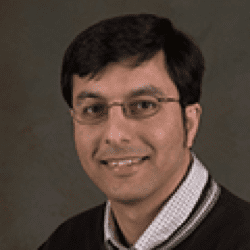Three Clemson University professors will receive support for research on health care provider well-being, genetics contributing to opioid addiction, and the improvement of microbial infection treatments – thanks to support from the Dr. Wallace R. Roy Distinguished Professorship program.
Emil Alexov and Dev Arya, both professors in the Clemson University College of Science, and Marissa Shuffler, an associate professor in the Clemson University College of Behavioral, Social and Health Sciences, have been named as Roy Professors for the next three years.
The professorship is named for Wallace R. Roy, one of the nation’s leading food technologists and a 1926 Clemson alumnus, who established a charitable trust for the benefit of the University. The endowed professorship provides supplemental support for outstanding faculty members for research with Prisma Health or other health system partners.
“Dr. Shuffler is an exceptional scholar. Her accomplishments embody the mission of our college to build people and communities through her research on healthcare provider wellbeing and teamwork. Her research has a significant influence on our local and regional healthcare systems, and national organizations. I am so pleased she has been selected for this respected professorship.”
Leslie Hossfeld, Dean of the College of Behavioral, Social and Health Sciences
The professorship appointments support ClemsonForward and its goals “to continuously improve its research quality, quantity and impact; to foster a rich, curiosity-driven intellectual environment; to solve real problems; and to create more opportunities for graduates and alumni.” The appointments enable one of the six strategic innovation areas – health innovation – which emphasizes biomedical sciences and biotechnology.
“The College of Science is fortunate to have outstanding faculty, like Drs. Arya and Alexov who are tackling some of tomorrow’s grand challenges and preparing the next generation of leading scientists. I’d like to congratulate both Dev and Emil who are being honored with Wallace R. Roy Distinguished Professorships in recognition of the significant impact of not only their new scientific discoveries but also the translation of their science with partners like Prisma Health to help improve health outcomes of South Carolinians and beyond.”
Cynthia Young, dean of the College of Science
Meet the newest Roy Professors and learn about their research.
Emil Alexov

Emil Alexov, a professor in the Department of Physics and Astronomy, is working with William Hand at Prisma Health to reveal the genetic signature and molecular mechanisms of opioid addiction. The goal is to identify genetic differences common for opioid-addicted individuals that are not present in non-addicted individuals and create a list of genes and variants linked to opioid addiction.
He is also working with Roger Stevenson, MD, and Steven Skinner, MD, at Greenwood Genetic Center. Their research goal is to reveal the effects of human genetic variants and their link with human diseases, specifically mental disorders. They hope this research will help provide early diagnostics and treatment.
In addition to his research, Alexov is leading the effort of 35 Clemson faculty to establish a new master’s and Ph.D. program in medical biophysics. The program will bridge academic and clinical research by linking the biology-oriented Clemson faculty with medical doctors at Prisma Health. Alexov’s research background includes protein-protein interactions and binding and developing methods, software and web servers to predict the effect of mutations on protein stability and protein-protein, protein-DNA/RNA binding. Furthermore, he and his team use these methods along with third-party approaches to study molecular effects originating from disease-causing mutations and thus to assess the molecular effects of mutations seen in the human population. Alexov is also a Clemson University School of Health Research (CUSHR) Faculty Scholar and has served as a CUSHR Faculty Fellow.
Dev Arya

Dev Arya is a professor in the Department of Chemistry. He has been working with MUSC (Medical University of South Carolina) and the UofSC (University of South Carolina) School of Medicine Greenville on several projects, including SARC-COV2 inhibitors, setting up a central repository for clinical fungal and bacterial isolates, and building a network of local researchers and clinicians interested in studying and treating microbial infections. During his professorship, he plans to continue these collaborative projects and further build this network of researchers and clinicians.
For the past 16 years, Arya’s laboratory has conducted physical and structural studies of natural and designed drugs capable of binding to nucleic acids and proteins. These studies are essential to both the fundamental understanding of macromolecule recognition and drug development. Ongoing projects have combined areas of synthetic organic chemistry, physical organic chemistry, biochemistry, pharmacology, and molecular and cell biology. The interdisciplinary nature of these projects has allowed leads in antimicrobial, anti-cancer and HIV targeted therapies. He was also a recipient of a National Science Foundation (NSF) CAREER Award in 2002. Arya is also a CUSHR Faculty Scholar and has served as a CUSHR Faculty Fellow.
Marissa Shuffler

Marissa Shuffler is an associate professor of industrial/organizational psychology in the Department of Psychology and director of Clemson’s DIGITAL (Deriving Innovative & riGorous scIence for Teaming And Leading) Research Lab, supervising a team of graduate and undergraduate students.
During her professorship, she plans to continue to expand her health care research on team well-being in the emergency medicine department and coordinate interventions for complex patient care multiteam systems. When the COVID-19 pandemic began in March 2020, Shuffler and Emily Hirsh, M.D., of Prisma Health began their collaborative research to track, monitor and increase health care provider well-being. Through surveys, Shuffler and Hirsh gave hospital management insight into how health care providers were caring for themselves during the pandemic and how hospital systems could prevent provider burnout.
Shuffler’s second goal will be to sustain and grow current research with Chip Wiper, M.D., and other clinical faculty that focuses on optimizing organizational and teaming dynamics for effective complex care coordination. The study examines the challenges of coordinating patient care across multiple teams of providers who must work across multiple departments, specialties and locations.
Shuffler has conducted research to assess training and development needs for military and civilian populations, including the design, implementation and analysis of both field and laboratory studies. She has conducted this and similar research for government, military and industry, including the U.S. Army Research Institute, NASA, the National Science Foundation, the Center for Army Leadership, the Department of Homeland Security, the U.S. Air Force and Prisma Health. Her research for these entities has focused on interventions needed to develop, sustain and maximize inter-and intra-team functioning and well-being. She has received an NSF CAREER Award in 2017 for improving the ways teamwork and leadership are taught in organizations. Shuffler is also a CUSHR Faculty Scholar, a CBSHS Research Innovation Faculty Fellow, and has been a CUSHR Faculty Fellow.
The Clemson University College of Behavioral, Social and Health Sciences (CBSHS), established in July 2016, is a 21st-century land-grant college that combines work in seven disciplines – Communication; Nursing; Parks, Recreation and Tourism Management; Political Science; Psychology; Public Health Sciences; and Sociology, Anthropology and Criminal Justice – to further its mission of “building people and communities” in South Carolina and beyond.
The Clemson University College of Science pursues excellence in scientific discovery, learning and engagement that is both locally relevant and globally impactful. The life, physical and mathematical sciences converge to tackle some of tomorrow’s scientific challenges, and our faculty are preparing the next generation of leading scientists. The College of Science offers high-impact transformational experiences such as research, internships and study abroad to help prepare our graduates for top industries, graduate programs and health professions.
Get in touch and we will connect you with the author or another expert.
Or email us at news@clemson.edu

